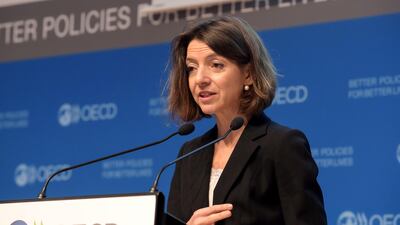The global economy will slow down amid escalating trade tensions and tighter financial conditions, the Organisation for Economic Co-operation and Development warned, revising down its outlook for next year.
The world's largest economies are forecast to grow at a slower pace of 3.5 per cent in 2019 and 2020 from 3.7 per cent this year as steeper interest rates, higher oil prices and the US-China trade war weigh on outlook, the OECD said in a report on Wednesday. Slashing taxes and increasing spending will be necessary to stimulate demand if global growth weakens sharply.
"The imposition of new tariffs and uncertainty about further restrictive trade actions are contributing to a marked slowdown in trade growth, dampening global investment and threatening jobs and living standards," OECD chief economist Laurence Boone said.
The organisation's gloomy outlook echoed a similar note of caution from the International Monetary Fund, which last month cut its global economic forecast for 2019 and 2020 for the first time since July 2016.
The IMF forecast global growth of 3.7 per cent in 2018 and 2019, 0.2 per cent lower than the fund's July forecast, and at the same pace of 2017.
"We see a good case for a coordinated response, particularly on fiscal policy," Ms Boone said. "We think the major economies should be preparing the ground for such a coordinated response now."
_______________
Read more:
Will emerging markets recover or will developed ones follow them downhill?
The taxing problem of how to avoid another financial crisis
Trade wars and falling Iran exports to impact supply and demand, says Opec
_______________
A full-scale trade war between the US and China, the world's two biggest economies, combined with political uncertainty could shave off 0.8 per cent off the global gross domestic product by 2021, according to OECD calculations.
The United States, at the heart of trade tensions escalated by the Donald Trump administration, is expected to perform better than most global economies. The OECD maintained its US forecast for 2019 and 2020, projecting growth will slow from 2.9 per cent this year to 2.7 per cent next year, and a little more than 2 per cent by 2020.
The OECD trimmed its forecast for China, expecting the world's second largest economy would decelerate from 6.6 per cent to 6 per cent in 2020, the slowest rate in 30 years.
The G-20 economies are projected to see growth slow down from 3.8 per cent this year to 3.7 per cent in the next two years, the organisation said. Euro economies will also slow down from 1.9 per cent this year to 1.8 per cent next year and 1.6 per cent in 2020.
Emerging economies will "remain vulnerable" to capital outflows as the US Fed continues to raise interest rates and the OECD cut its outlook for countries including Brazil, Turkey and South Africa.
The US Fed is expected next month to raise interest rates for the fourth time this year,
Saudi Arabia's economy, the only Arab G-20 economy, is projected to grow from 1.7 per cent this year to 2.6 next year and 2.5 per cent in 2020, the organisation said.
“There are few indications at present that the slowdown will be more severe than projected. But the risks are high enough to raise the alarm and prepare for any storms ahead," said Ms Boone said. "Cooperation on fiscal policy at the global and euro level will be needed."


